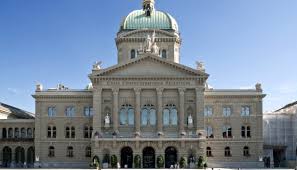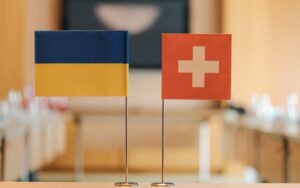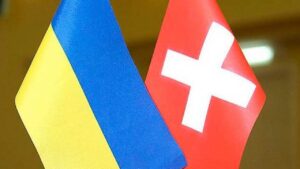
A Swiss parliamentary committee voted late on Thursday night in favor of allocating 5 billion Swiss francs ($5.5 billion) in aid to Ukraine, Reuters reports.
“A Swiss parliamentary committee voted late on Thursday night to allocate 5 billion Swiss francs ($5.5 billion) in aid to Ukraine as part of a broader package aimed at boosting the defense capabilities of neutral Switzerland. Backed by lawmakers from center-left and center-right parties, the upper house’s security committee approved the package, which provides 10.1 billion francs in additional funds for the army, along with the amount for Ukraine,” it said.
The plan was adopted by 8 votes to 5, with right-wing parties opposed. It is noted that it will have to pass a number of parliamentary hurdles before the plan becomes law.
“The parliament statement said the multi-billion dollar package was conceived as an extraordinary contribution to Swiss security and ‘peace in Europe’ in the wake of the war Russia is waging against Ukraine,” the statement said.
The parliament also said that the Ukrainian part of the package is aimed at supporting the reconstruction and repair ofeveryday infrastructure necessary for life in Ukraine.

The Swiss government will allocate 5 billion francs as part of its long-term support for Ukraine. The program will last for 12 years, until 2036, the government’s press service reports.
“As a first step, about 1.5 billion Swiss francs are to be allocated from the international cooperation budget by 2028. This amount clearly demonstrates Switzerland’s solidarity with the people affected by the war in Ukraine and will increase stability on the European continent,” the statement said.
It is noted that in the period 2029-2036, the Federal Council also intends to explore other sources (in addition to international cooperation) from which the remaining 3.5 billion Swiss francs can be obtained.
The Federal Council has also commissioned the development of a joint country program for Ukraine, including appropriate oversight mechanisms. This program should ensure targeted and effective support and be based on the seven Lugano principles: partnership, reform focus, transparency, accountability and rule of law, democratic participation, multi-stakeholder engagement, gender equality and inclusiveness, and sustainability.
The Federal Council also instructed to determine how the country program for Ukraine will be implemented in the strategic plan. In particular, a proposal to establish an interagency coordination group headed by a delegate from Ukraine should be prepared and submitted to the Federation Council for approval.

On June 15-16, the Swiss government will hold a two-day high-level conference aimed at achieving peace in Ukraine, Reuters reports, citing a government statement.
Earlier in January, Switzerland announced that it would host the peace summit at the request of Ukrainian President Volodymyr Zelenskyy, and has since held talks with the EU, G7 member states, and countries such as China and India to secure their support.
“There is now sufficient international support for a high-level conference to launch the peace process,” the Federal Council said in a statement.
The conference will be held at the Burgenstock resort in the canton of Nidwalden near the city of Lucerne. Its goal is to create a framework conducive to a comprehensive and lasting peace in Ukraine, as well as “a concrete roadmap for Russia’s participation in the peace process.”
The Swiss authorities have not yet disclosed the full list of participants.
Source: https://www.reuters.com/world/europe/switzerland-host-ukraine-peace-summit-june-15-16-2024-04-10/

At a meeting on Wednesday, the Swiss Federal Council decided to allocate CHF5 billion ($5.53 billion) for Ukraine’s economic development and long-term recovery until 2036 as part of strengthening existing cooperation, the Swiss government portal reports.
“As a first step, it is planned to attract about CHF1.5 billion from the international cooperation budget until 2028. This amount clearly demonstrates Switzerland’s solidarity with the people affected by the war in Ukraine and will increase stability on the European continent,” the statement said.
Citing the World Bank’s estimate, it is reported that the funds needed for reconstruction in Ukraine are estimated at $486 billion (about CHF440 billion). “Switzerland is already supporting projects in Ukraine aimed at restoring the destroyed civilian infrastructure in the energy, roads, and health sectors. In addition, Switzerland and Ukraine jointly launched the process of political recovery on a large scale at the Ukraine Recovery Conference in Lugano in July 2022,” the statement said.
According to the government, Switzerland has already spent about CHF3 billion on these and other measures to support people affected by the war in Ukraine. About CHF425 million of this amount was received from the international cooperation budget, and the rest (about CHF2.5 billion) was spent by the State Secretariat for Migration on reception and support of people with S protection status in Switzerland.
Over the next 12 years, the Swiss Federal Council intends to intensify its support for Ukraine’s recovery and develop cooperation with the private sector. “Given the current financial situation of the Swiss federal government, the Federal Council has proposed a phased approach: support for Ukraine from the international cooperation budget will amount to CHF 1.5 billion by 2028. In 2029-2036, the Federal Council also intends to study support for Ukraine’s recovery from the international cooperation budget until 2028. The Federal Council also intends to explore other sources (other than international cooperation) from which the remaining CHF3.5 billion can be obtained,” the statement said.
At its meeting on Wednesday, the Federal Council also commissioned the development of a program for Ukraine, which should provide targeted and effective support and be based on the seven Lugano principles: partnership, reform focus, transparency, accountability and the rule of law, democratic participation, multi-stakeholder engagement, gender equality and inclusiveness, and sustainability.

Switzerland intends to hold a high-level conference on a settlement in Ukraine in mid-June, Bloomberg reported on Monday, citing sources.
“The conference may take place on June 16-17, but it is not yet clear how many countries will participate,” the agency informs, noting that it could be 80-100 countries, representing mainly the “global South.”
According to the agency’s interlocutors, the key issue is China’s participation, which will allow Switzerland to “ensure the credibility of the initiative.”
A representative of the Swiss Foreign Ministry noted that the date and venue of the conference are still unknown. The agency’s sources said it could be held in the Swiss city of Lucerne.
“In addition to the positions of Ukraine, Russia and Europe, it is important to hear the opinion of the “global South”, which will play a key role in the possible inclusion of Russia in this process. That is why we maintain close contacts with China, India, Brazil, South Africa and Saudi Arabia,” the Swiss Foreign Ministry spokesman added.
Bloomberg notes that several countries insist on Russia’s participation in the conference, but Kyiv wants to reach an agreement on key principles that “will form the basis for a future agreement” before engaging Moscow in the dialogue.

President of Ukraine Volodymyr Zelenskyy has said that Ukraine and its partners do not consider the possibility of Russian representatives attending the inaugural Peace Summit to be held in Switzerland.
“Today we talked a lot about our Formula for Peace. I am grateful for the support of Mr. President. I informed Mr. President about the preparation of the global Peace Summit at the level of leaders, which is being organized in Switzerland – the inaugural Peace Summit,” he said during a press conference with the Turkish President in Istanbul.
According to Zelenskyy, “it is obvious that Turkey’s special role deserves to be demonstrated at the Peace Summit and in the joint work of the world majority to fully implement the Peace Formula.”
“As for the format of the inaugural Summit itself, we do not see any representatives of Russia at this Summit. We do not see how people who block, destroy and kill everything can be invited. We want to get a result. The result of a just peace, and a just peace for Ukraine,” the President of Ukraine said.
Therefore, Zelenskyy noted, “first, the civilized countries of the world will develop a detailed plan and have a result (based on the results of the first Peace Summit – IF-U).”
“And only then will they involve representatives of Russia – those who will be ready for a just peace,” he concluded.
Earlier, during a press conference with Zelenskyy, Turkish President Recep Tayyip Erdogan said that Turkey was ready to host a peace summit, but with the participation of Russia.